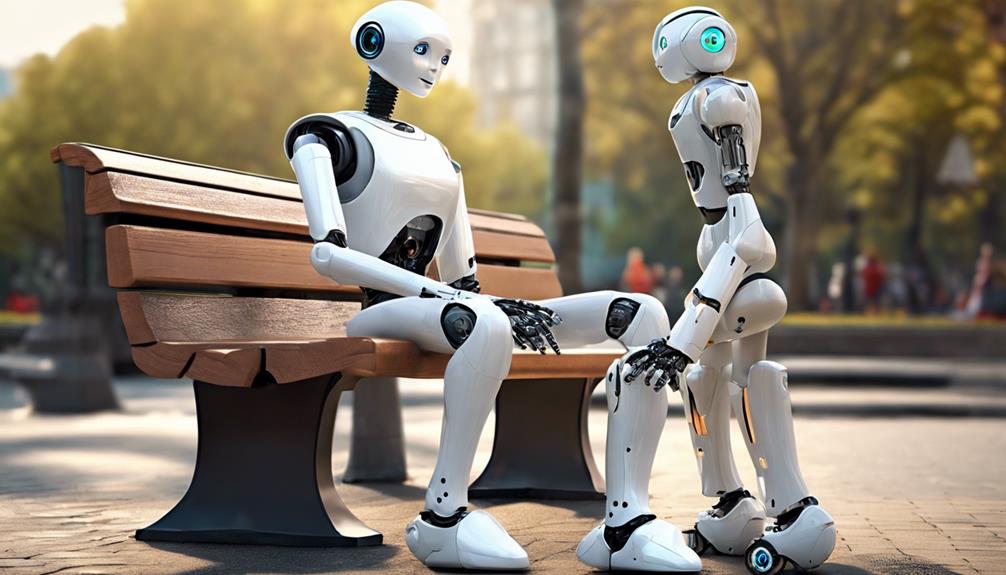Have you ever thought about how social robots impact the nature of friendship?
The evolving role of AI-powered companions is not just a glimpse into the future but a profound shift in the way we connect and find support.
As we navigate this transformative journey alongside social robots, the impact on our lives and relationships is profound, raising intriguing questions and possibilities about the future of companionship.
Key Takeaways
- Social robots combat loneliness, provide emotional support, and enhance well-being.
- Ethical considerations guide design for authentic relationships and privacy protection.
- Future trends focus on AI advancements, personalized interactions, and emotional intelligence in robotics.
- Social robots revolutionize interactions, support systems, and companionship with meaningful connections.
Impact of Social Robots on Companionship
Social robots revolutionize companionship by actively engaging in activities and conversations, alleviating loneliness and providing vital emotional support to individuals. Among seniors, feelings of loneliness and social isolation can often be overwhelming, impacting their overall well-being.
Social robots like ElliQ step in to bridge this gap, offering companionship and interaction that mimic human-to-human engagement. By participating in daily activities and healthcare routines, these robots become integral parts of seniors' lives, not only assisting practically but also emotionally.
The impact of social robots on companionship is profound; they serve as a constant source of support, understanding, and connection, combating the isolation that many seniors face. Through their ability to provide reminders, facilitate video calls, and engage in meaningful interactions, social robots are transforming the way individuals experience companionship, especially for those who may otherwise be isolated or lacking in social interaction.
Emotional Support Through Social Robotics

Amidst the evolving landscape of technological advancements, emotional support through robotics is reshaping how individuals combat loneliness and enhance their well-being. Social robots are offering deep emotional support to older adults by leveraging advanced features such as natural language processing and the ability to recognize facial expressions. By interpreting social cues and facial emotions, these robots can establish an emotional bond with their users, providing interactive communication tailored to individual needs.
Studies have highlighted the positive impact of social robots for emotional support, showing a reduction in loneliness among seniors who engage with these companions. Through interactive communication and tailored responses, these robots play a crucial role in enhancing emotional companionship and overall well-being. By addressing the unique emotional needs of older adults, social robots are transforming the way individuals receive support and companionship, paving the way for a future where technology serves as a vital tool in reducing social isolation and enhancing emotional well-being.
Ethical Considerations in Social Robotics
Considering the ethical implications surrounding the integration of social robots into daily life, we confront a myriad of concerns that demand careful examination and proactive solutions. Ethical considerations in social robotics encompass various aspects, including the risk of inauthentic relationships and the potential for cognitive decline among users. Designing social robots with robust privacy protection features is paramount to safeguard the personal data shared during interactions. Balancing the advantages of social robots with challenges such as the loss of genuine human connection and the ethical implications they pose requires thoughtful deliberation.
To navigate these complexities, it's crucial to establish clear ethical guidelines for the design and operation of social robots. These guidelines serve to promote responsible and beneficial use while upholding user autonomy and fostering respectful and transparent human-robot relationships. Ongoing research endeavors aim to address ethical dilemmas, enhance user autonomy, and ensure that interactions with social robots are conducted in a manner that's both ethical and beneficial for all involved.
Enhancing Lives With Social Robots

Navigating the realm of ethical considerations in social robotics has illuminated the transformative potential these robots hold in enhancing lives. Social robots like ElliQ play a crucial role in providing deep emotional support, social interaction, and companionship, especially for seniors facing loneliness. Through interactive communication and understanding human emotions, these robots have been shown to reduce feelings of isolation and enhance overall well-being. Additionally, by utilizing advanced technologies such as natural language processing, social robots can engage in meaningful conversations tailored to individual interests, creating a sense of connection and companionship.
Moreover, interactive companions like Pepper, Moxie, and Zenbo not only offer daily activities reminders but also assist with household tasks, further enriching the lives of users. The focus on learning social skills and facilitating interactive communication underscores the commitment of social robots to enhance the quality of life for individuals by providing vital support and companionship.
Future Trends in Social Robotics
Embracing the forefront of technological evolution, social robotics is poised to revolutionize interactions and support systems through advanced AI capabilities and personalized engagements tailored to individual needs. As social robots continue to evolve, they are transforming the landscape of companionship and assistance by providing emotional support, reducing loneliness, and enhancing the lives of many. The integration of natural language processing allows these robots to engage in personalized interactions, adapting their responses to meet the unique preferences and requirements of each individual. Furthermore, the advancement of emotional intelligence in AI and robotics enables social robots to perceive and respond to human emotions effectively, fostering more meaningful and empathetic connections.
| Future Trends in Social Robotics |
|---|
| Providing emotional support |
| AI and robotics |
| Enhancing the lives |
| Reducing loneliness |
| Healthcare applications |
Frequently Asked Questions
How Will Robots Transform Our Lives in the Future?
In the future, robots will revolutionize our lives by enhancing efficiency and convenience across various sectors. They'll streamline tasks, boost productivity, and offer personalized experiences.
Their impact will be profound in healthcare, education, and daily interactions, providing tailored solutions to societal needs. With advanced AI capabilities, robots will adapt seamlessly to our preferences, making them indispensable companions in our evolving world.
The future holds exciting possibilities as robots continue to transform our lives.
What Is the Future of Social Robots?
We believe the future of social robots holds exciting potential. These robots are evolving rapidly, integrating advanced AI for more personalized interactions.
With names like Pepper, Moxie, and Zenbo leading the way, we anticipate enhanced emotional intelligence in robots, enabling them to provide better companionship and support.
As researchers strive to improve human-robot interaction and address ethical concerns, social robots are poised to transform various aspects of our lives.
What Are the Benefits of Companion Robots?
We believe companion robots offer numerous benefits like emotional support, alleviating loneliness, providing reminders for daily tasks and healthcare routines, and enhancing cognitive stimulation.
Interacting with social robots like ElliQ and Pepper can improve mental health outcomes by fostering a sense of companionship and connection.
With the use of natural language processing, these robots can understand individual preferences, creating personalized interactions for users that lead to social engagement and overall well-being.
What Are the Benefits of Sociable Robots?
We believe sociable robots bring immense benefits. They provide companionship, emotional support, and engagement, reducing loneliness and enhancing well-being. These robots can converse, engage in activities, and offer reminders, improving cognitive functions and overall quality of life.
With advanced technologies like natural language processing, they understand human speech and emotions, adapting responses accordingly. In healthcare, they assist in patient care, medication reminders, and stress reduction, making a significant impact on individuals' lives.
Conclusion
In conclusion, the integration of social robots in companionship has truly revolutionized the way we connect and interact with technology.
As we continue to embrace these AI companions, we're reminded of the adage 'two heads are better than one.' With their emotional support, understanding, and personalized interactions, social robots are transforming lives and bridging the gap for social interactions.
The future holds endless possibilities for enhancing our well-being and companionship through the power of technology.









